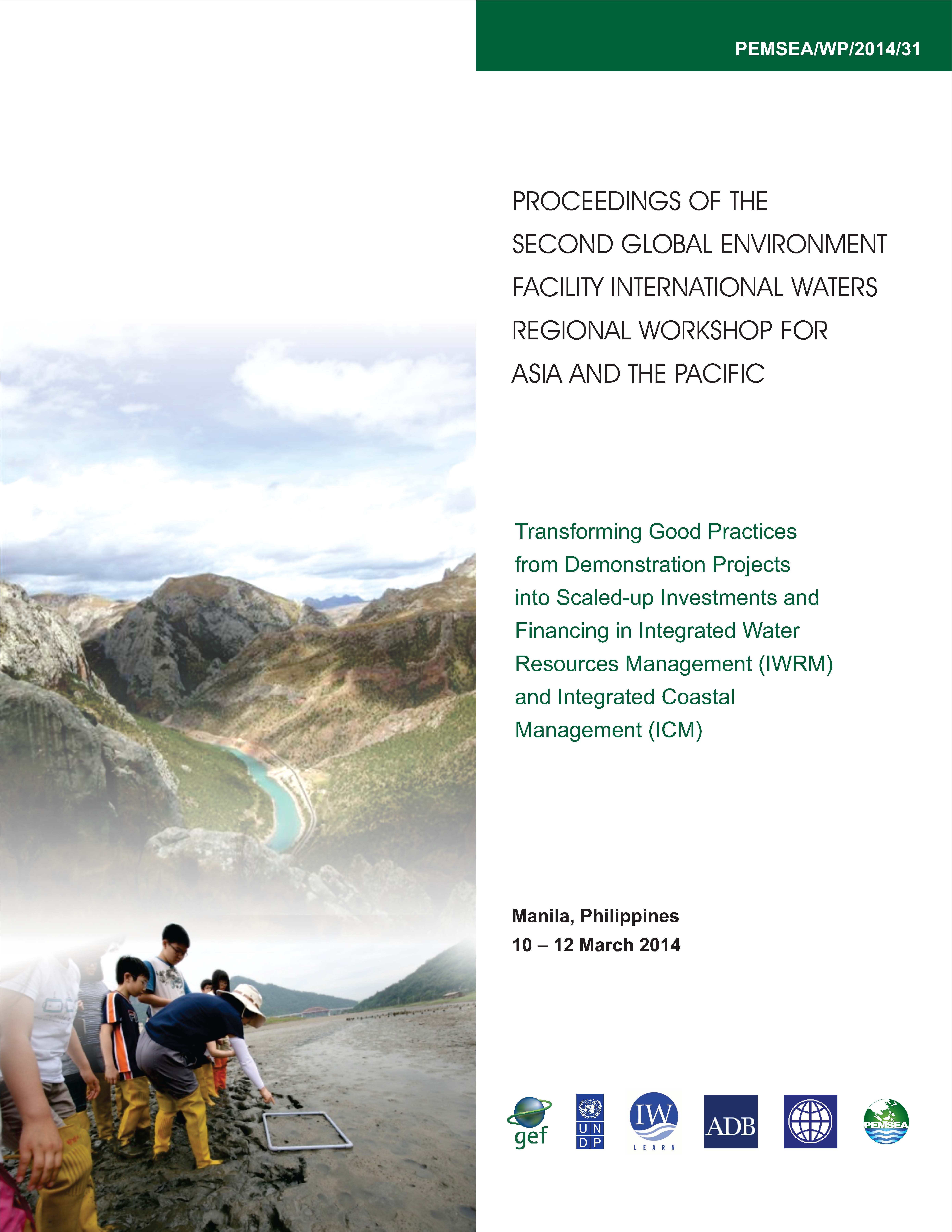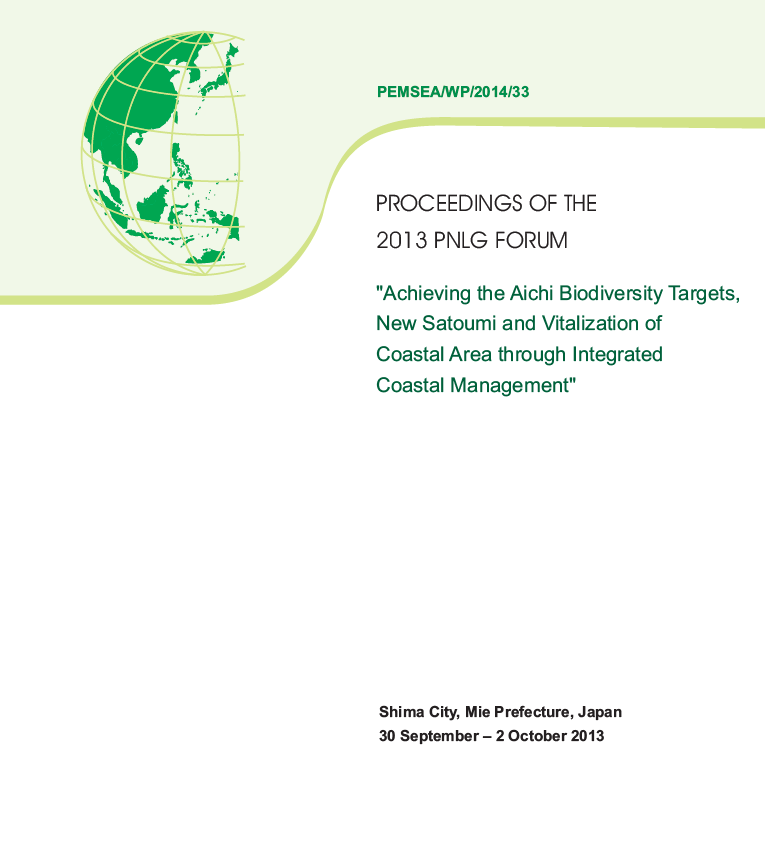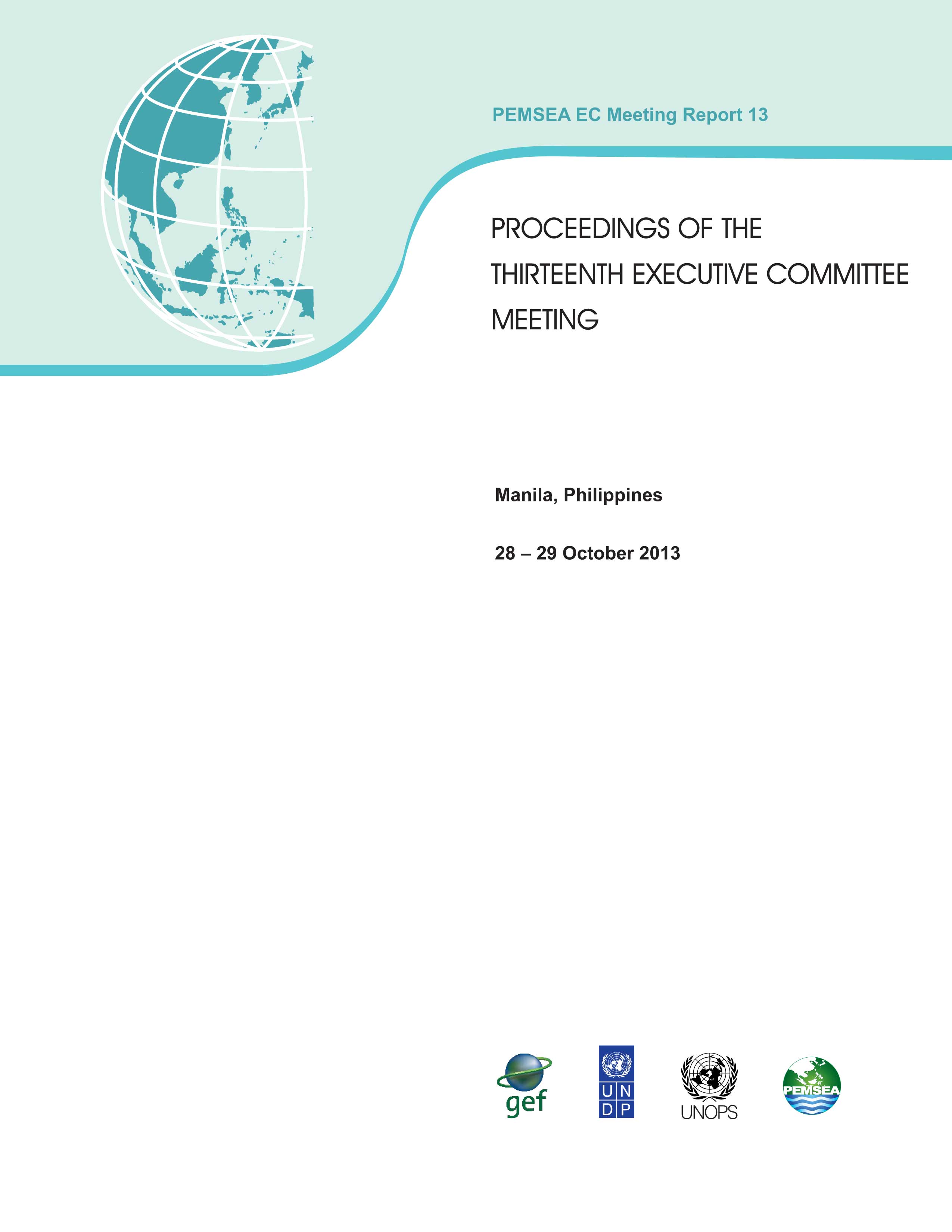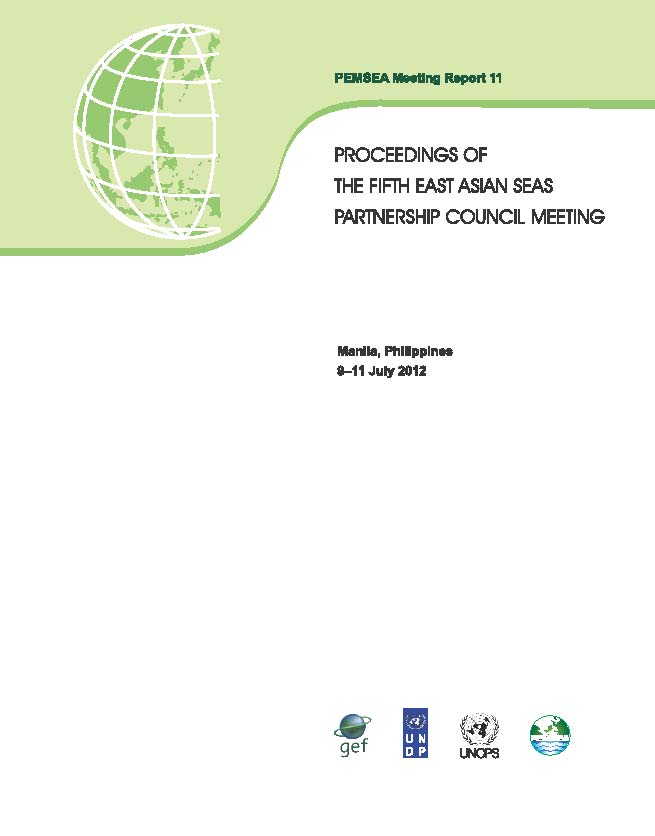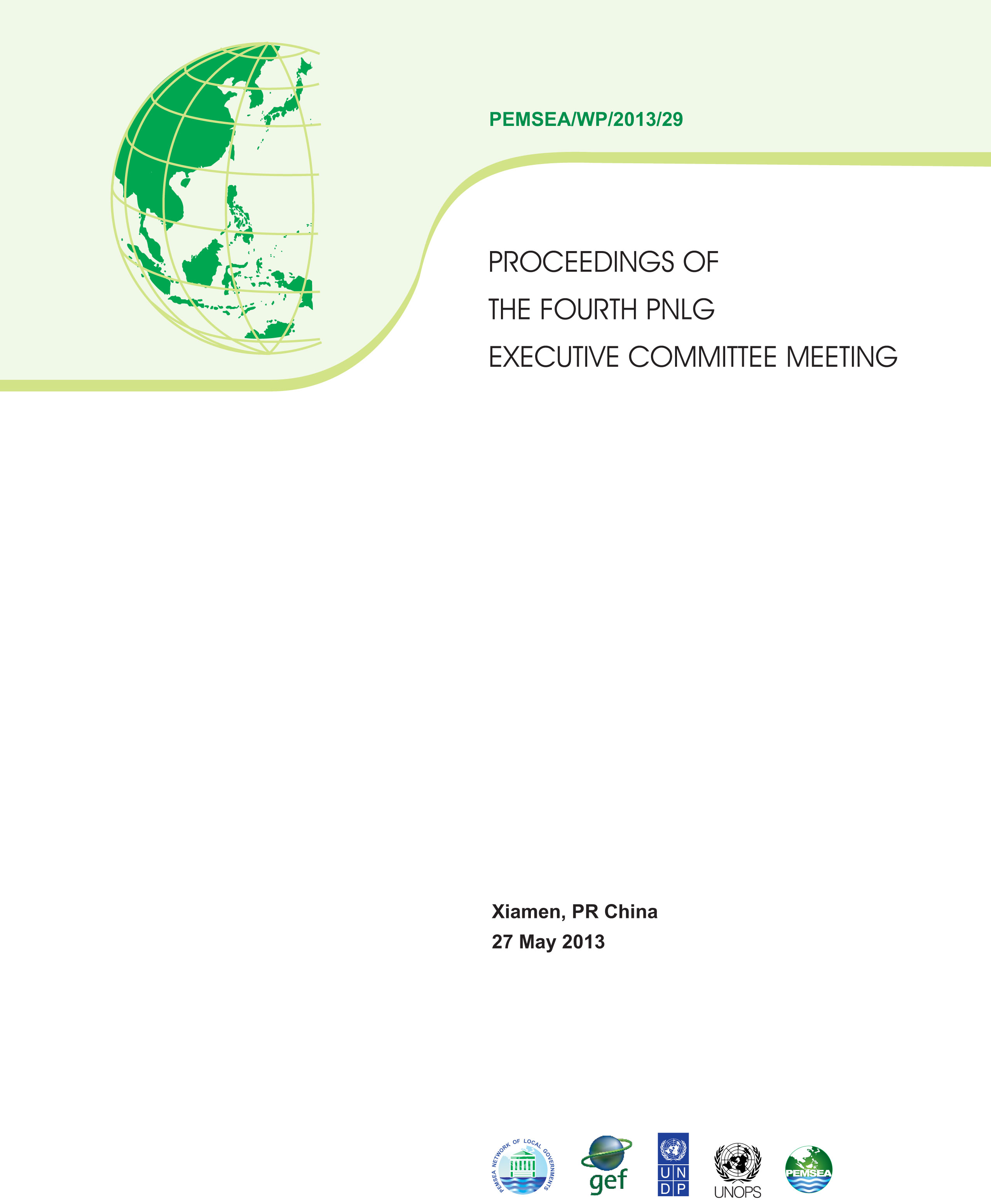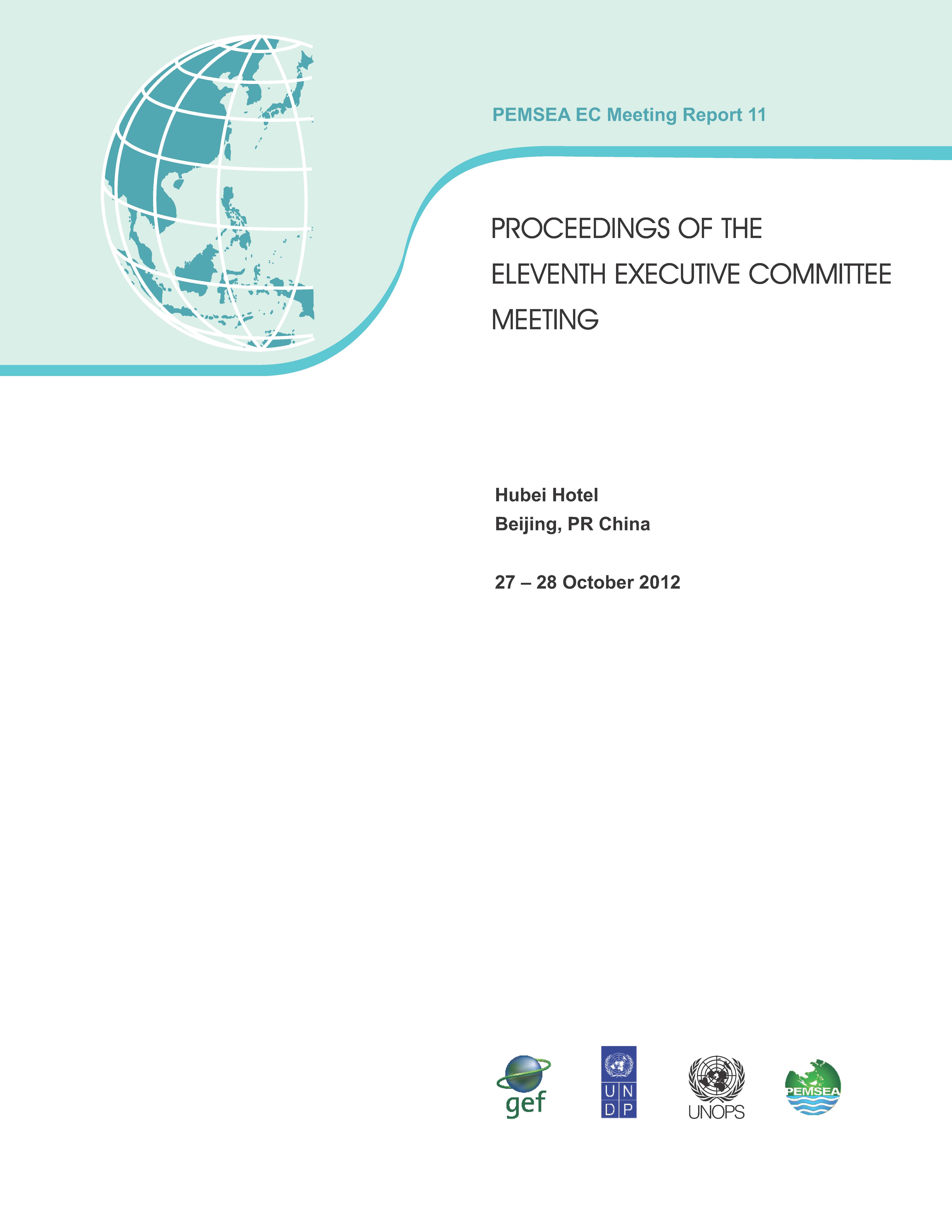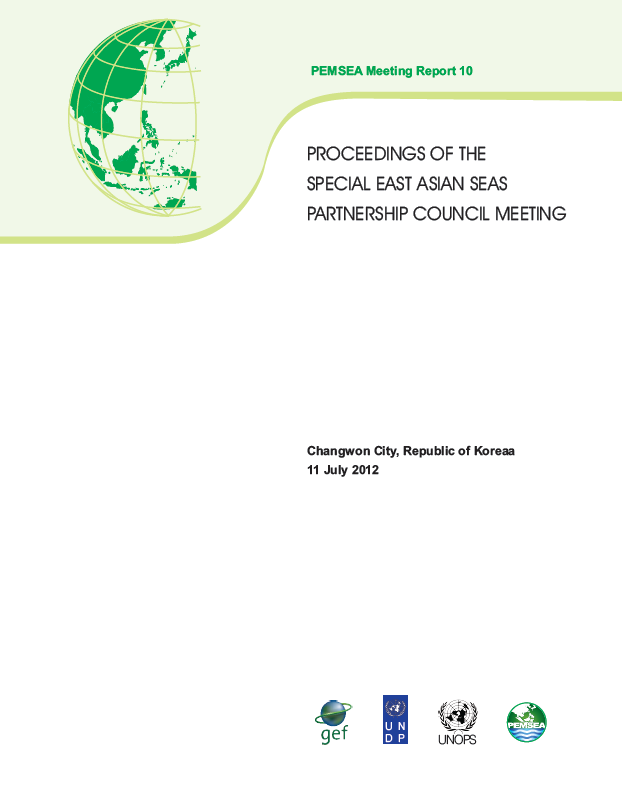
Breadcrumb
-
Proceedings of the 2nd Global Environment Facility (GEF) International Waters (IW) Regional Workshop for Asia and the Pacific
Transforming Good Practices from Demonstration Projects into Scaled-Up Investments and Financing in Integrated Water Resources Management (IWRM) and Integrated Coastal Management (ICM) The Second Global Environment Facility (GEF) International Waters (IW) Regional Workshop for Asia and the Pacific was held from 10–12 March 2014 at the Asian Development Bank (ADB) and Crowne Plaza Hotel, Manila, Philippines. The regional workshop was organized by the GEF International Waters: Learning Exchange and Resource Network (IW: LEARN) in collaboration with ADB, World Bank (WB) and Partnerships in Environmental Management for the Seas of East Asia (PEMSEA). The workshop aimed to strengthen the performance of GEF IW projects through: (a) facilitating and promoting good policies and practices; and (b) leveraging increased investments in habitat conservation, nutrient reduction and water resource use. Specifically, the workshop aimed to: (a) review case studies and good practices in the development, facilitation and implementation of investment projects addressing issues under the blue (ecosystem) and brown (pollution) sectors; (b) share knowledge and experience on key aspects of scaling up and replication of good practices and lessons learned from demonstration projects; and (c) explore advances in knowledge harvesting tools and indicators, as well as in developing knowledge services and products that strengthen ownership and commitment among policymakers and investors in scaling up and replication of good practices.
-
Proceedings of the 2013 PNLG Forum
"Achieving the Aichi Biodiversity Targets, New Satoumi and Vitalization of Coastal Area through Integrated Coastal Management"
Shima City, Mie Prefecture, Japan, 30 September – 2 October 2013
A. INTRODUCTION
i. The 2013 PEMSEA Network of Local Governments for Sustainable Development (PNLG) Forum was held at the Nemuno Sato Hotel and Resort, Shima City, Mie Prefecture, Japan, from 30 September to 2 October 2013. The Shima City Government hosted the Forum with support from the Ocean Policy Research Foundation (OPRF).
ii. The Forum was attended by representatives from the PNLG regular members, namely: Cambodia (Preah Sihanouk); PR China (Dongying, Fangchenggang, Haikou, Laoting, Qinzhou, Quanzhou and Xiamen); Indonesia (Denpasar City, Gianyar Regency, Karangasem Regency, Sukabumi Regency and Tabanan Regency); Japan (Shima); Malaysia (Northern Selangor and Port Klang); Philippines (Bataan, Batangas, Cavite and Guimaras provinces); RO Korea (Changwon City and Shihwa); and Vietnam (Danang and Quang Nam). Representatives from the PNLG associate members, the First Institute of Oceanography (FIO) of the State Oceanic Administration and Coastal and Ocean Management Institute (COMI) of Xiamen University, PR China, were also present.
iii. Representatives from various local governments and various institutions served as observers, including: Cambodia (Kampot, Kep and Koh Kong provinces); China (State Oceanic Administration); Indonesia (Bangli); Japan (Ministry of Land, Infrastructure, Transport and Tourism; Ministry of Environment; The Nippon Foundation; Tokyo University; Kaiyo Construction Co. Ltd. and Intercom); Lao PDR (Champasak Province); Timor-Leste (Manatuto and Liquica districts and National Directorate for Fisheries and Aquaculture).
iv. The PNLG Secretariat in Xiamen and PEMSEA Resource Facility (PRF) served as the Secretariat for the Meeting, while the Agriculture and Fisheries Department and Satoumi Promotion Project Team of Shima City served as the local secretariat.
v. The meeting agenda and full list of participants are attached as Annex 1 and 2.
-
Proceedings of the Thirteenth Executive Committee Meeting
The Thirteenth (13th) Executive Committee Meeting was held at the Oakwood Hotel and Bulwagan Ninoy at the Protected Areas and Wildlife Bureau (PAWB) of the Department of Environment and Natural Resources (DENR), Manila, Philippines, on 28 and 29 October 2013, respectively. This publication summarizes the output of the meeting. The Meeting focused on the following key issues: establishment of a PEMSEA Trust Fund as a sustainable financing mechanism; selection of a PRF Executive Director; preparation for PEMSEA's next phase and ensuring continuity and sustainability of PEMSEA's operations, among others.
Document Number Document Title EC/13/DOC/01 List of Documents EC/13/DOC/02 Provisional Agenda EC/13/DOC/03 Establishing a PEMSEA Trust Fund
-
Proceedings of the Fifth East Asian Seas Partnership Council Meeting
The Fifth (5th) East Asian Seas (EAS) Partnership Council Meeting was held at the Diamond Hotel, Manila, Philippines, on 9–11 July 2013. The Department of Environment and Natural Resources (DENR) of the Philippines hosted the Meeting. The Meeting was attended by representatives from 9 Country Partners, 12 Non-Country Partners, United Nations Development Programme (UNDP), the World Bank and observers from Thailand, IPIECA and University of Queensland. The Council focused on the following major issues: (a) transformation of PEMSEA; (b) collaborative planning among Country and Non-Country Partners and other organizations for SDS-SEA implementation; (c) updating of the SDS-SEA and its strategic targets and implementation plan; and (d) EAS Congress and Ministerial Forum 2015. Overall, the Council emphasized the need for strengthened engagement and ownership by both Country and Non-Country Partners to ensure the success of transforming PEMSEA into a self-sustaining regional organization for SDS-SEA implementation. This publication summarizes the proceedings of the meeting.
PC/13/DOC/14 Transformation of PEMSEA: Implementation of the PRF Re-Engineering and Sustainable Financing Plans
(Document available upon request)PC/13/DOC/15 Draft Framework Programme for the Ministerial Forum 2013
(Document available upon request)
-
Proceedings of the Fourth PNLG Executive Committee Meeting
The Fourth PEMSEA Network of Local Governments for Sustainable Coastal Development (PNLG) Executive Committee Meeting was held at the Jingmin Central Hotel, Xiamen, PR China, on 27 May 2013. The Xiamen Municipal Government and the PNLG Secretariat hosted the meeting.
-
Proceedings of the Twelfth Executive Committee Meeting
The Twelfth (12th) Executive Committee Meeting was held at the EDSA Shangri-La Hotel, Manila, Philippines, on 3 and 4 April 2013. This publication summarizes the output of the meeting. The meeting focused on key issues pertaining to the following: strengthening the regional ownership of PEMSEA; implementation of the PRF Re-Engineering Plan; implementation of the 5-Year Regional SDS-SEA Implementation Plan; election of a new set of Partnership Council Officers and Co-Chairs; status of PEMSEA’s Trust Fund; status of GEF Evaluation Office impact evaluation report on South China Sea project and adjacent seas, among others.
Document Number Document Title EC/12/DOC/02 Provisional Agenda EC/13/DOC/01 List of Documents EC/13/DOC/03 Provisional Annotated Agenda EC/13/DOC/04 Implementation of the Recommendations of the 11th EC Meeting and Outcome of the Terminal Evaluation EC/13/DOC/05 Strengthening Regional Ownership of PEMSEA EC/13/DOC/06 Transformation of PEMSEA: Implementation of the PRF Re-Engineering Plan EC/13/DOC/07 Implementation of the 5-Year Regional SDS-SEA Implementation Plan EC/13/DOC/08 Election of Partnership Council Officers and Co-Chairs
-
Proceedings of the Eleventh Executive Committee Meeting
The Eleventh (11th) Executive Committee Meeting was held at the Hubei Hotel, Beijing, China on 27 and 28 October 2012. This publication summarizes the output of the meeting. The meeting delved on critical issues pertaining to: PEMSEA's transformation into a sustainable operating mechanism; strengthening the leadership and ownership of PEMSEA; and ensuring PEMSEA’s continuity. In general, the Meeting underscored that PEMSEA’s sustainability depends highly on the continued strengthening of the partnership and ownership of PEMSEA by the Countries who are the major stakeholders in the region, as well as by the Non-Country Partners, collaborators, and donors/sponsors that play a crucial role in meeting the objectives of the Sustainable Development Strategy for the Seas of East Asia (SDS-SEA).
Document Number Document Title EC/12/DOC/01 List of Documents EC/12/DOC/02 Provisional Agenda EC/12/DOC/03 Provisional Annotated Agenda EC/12/DOC/04 Implementation of the Recommendations of the 10th Executive Committee Meeting and Decisions of the Special EAS Partnership Council Meeting EC/12/DOC/05 Transforming PEMSEA into a Sustainable Operating Mechanism EC/12/DOC/06 Strengthening PEMSEA’s Leadership and Ownership EC/12/DOC/07 Ensuring PEMSEA's Continuity EC/12/DOC/08 Catalyzing Partnerships in Coastal and Ocean Management
-
Proceedings of the Special EAS Partnership Council Meeting (Changwon City, Republic of Koreaa : 11 July 2012)
The Special East Asian Seas Partnership Council Meeting was held at the Amoris A, Pullman Hotel, Changwon City, Republic of Korea, on 11 July 2012. The City Government of Changwon and the Ministry of Land, Transport and Maritime Affairs (MLTM) of RO Korea hosted the Meeting.
The Meeting was attended by the members of the Executive Committee. Representatives from nine (9) PEMSEA Country Partners were in attendance, namely: Cambodia, China, Indonesia, Japan, Lao PDR, RO Korea, Singapore, Timor Leste, and Vietnam. A representative from Thailand was present as an observer. Representatives from 14 Non-Country Partners were in attendance, namely: ASEAN Centre for Biodiversity (ACB); Coastal Management Center (CMC); International EMECS Center; International Ocean Institute (IOI); Korea Maritime Institute (KMI); Korea Ocean Research and Development Institute (KORDI)1; Northwest Pacific Action Plan (NOWPAP); Ocean Policy Research Foundation (OPRF); Oil Spill Response Ltd. (OSRL); PEMSEA Network of Local Governments (PNLG); Plymouth Marine Laboratory (PML); GEF Small Grants Programme (SGP); United Nations Environment Programme Global Programme of Action (UNEP GPA); and Yellow Sea Large Marine Ecosystem (YSLME).
Representatives from the UNDP Manila and UNDP Regional Centre in Bangkok were present on behalf of the implementing agency. Representative from the GEF was present on behalf of the funding agency. A representative from the World Bank was present as a sponsoring agency. Representatives from Bogor Agricultural University; Sulu Celebes Sea Sustainable Fisheries Management; Western and Central Pacific Fisheries Commission served as observers. The PEMSEA Resource Facility served as the Secretariat for the Meeting.
